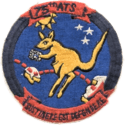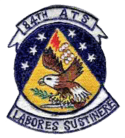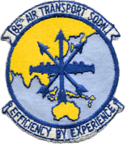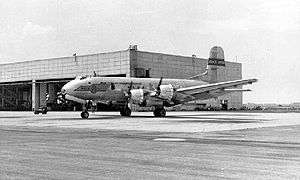1701st Air Transport Wing
| 1701st Air Transport Wing | |
|---|---|
|
1701st Air Transport Wing Douglas C-74 Globemaster at Brookley AFB | |
| Active | 1944–1957 |
| Country | United States |
| Branch | United States Air Force |
| Type | Airlift |
The 1701st Air Transport Wing is an inactive United States Air Force unit. It was last assigned to the Western Transport Air Force, Military Air Transport Service, stationed at Brookley Air Force Base, Alabama. It was inactivated on 18 June 1957.
History
Formed in mid-1944 by Air Transport Command after Great Falls Army Airfield, Montana was taken over from II Bomber Command. Mission of the unit was to coordinate Lend-Lease shipments of equipment including P-39, C-47, B-25, and A-20 aircraft. B-25 Mitchell Bombers arrived by rail and were assembled on base, others were flown in by both military and Women Airforce Service Pilots (WASPs). These aircraft were later flown by U.S. pilots by way of the Northwest Staging Route through Canada, to Fairbanks, Alaska, and transferred to Russian pilots who in turn flew them into Siberia via the Alaskan-Siberian Route (ALSIB). A total of 1,717,712 pounds of cargo containing aircraft parts, tools miscellaneous equipment, explosives and medical supplies were shipped through Great Falls Army Air Base to Russia. Aircraft shipments to the Soviet Union stopped in September 1945, when World War II ended, with approximately 8,000 aircraft having been processed in a 21-month period. Following the war, the unit assumed a support mission for military personnel assigned to Alaskan military installations.
On June 25, 1948 Operation Vittles, the strategic airlift of supplies to Berlin's 2,000,000 inhabitants, was initiated. The 547th (later 1701st) ATW played a critical role in assuring the success of this vital operation. Officials selected Great Falls AFB as the only replacement aircrew training site for Berlin Airlift-bound C-54s, officially activating the 517th Air Transport Wing. Using radio beacons, Great Falls AFB was transformed to resemble Tempelhof Airport in Berlin, Germany. Hundreds of pilots and Flight Engineers many of whom were recalled to active duty, were qualified on the C-54 aircraft and on flight procedures to and from Berlin by practicing on ground mock-ups and flying simulated airlift missions.
Later, the 517th Air Transport Wing was redesignated the 1701st Air Transport Wing. This wing’s primary mission was the routing and scheduling of flights throughout the Pacific Ocean region and in support of allied forces in the Korean War. The Military Air Transport Service (MATS) reopened the C-54 Flight Training School as the 1272d Medium Transition Training Unit in May 1950, one month before the Korean War began.
The 1701st ATW was later replaced by the 1300th Air Base Wing was moved to Brookley AFB, Alabama in a name-only transfer, assuming control of the 1703d Air Transport Group supporting the Mobile Air Material facilities. At Brookley, the 1703d was redesignated as a Heavy Transport Wing, controlling a C-124 Globemaster II strategic airlift squadron as well as the United States Air Force C-74 Globemaster fleet of very heavy lift aircraft.
Throughout the 1950 and 1960s the 1701 ATW flew strategic airlift missions on a worldwide scale with its C-124 fleet after the retirement of the C-74 until 1957 when Brookley AFB was reassigned to Air Material Command.
Lineage
- Established as: 1455th AAF Base Unit, and activated on 1 Aug 1944
- Redesignated: 517th Air Transport Wing, 1 Jun 1948
- Redesignated: 1701st Air Transport Wing, 1 Oct 1948
- Redesignated: 1701st Air Transport Wing, Heavy 1 May 1953
- Inactivated 18 June 1957.
Assignments
- Alaskan Division, Air Transport Command, 1 August 1944
- Continental Division, Air Transport Command, 1 October 1945
- Pacific Division, Air Transport Command, 1 July 1946
- Pacific Division, Eastern Pacific Wing, Air Transport Service, 1 January 1947
- Pacific Division, Military Air Transport Service, 1 July 1948
- Continental Division, Military Air Transport Service, 1 May 1953 – 18 June 1957
Components



Groups
- 517th Air Transport Group, 1 July 1948
- Redesignated 1701st Air Transport Group, 1 October 1948-1 June 1953
- 1703d Air Transport Group, 1 May 1953 – 18 June 1957
Squadrons
- 5th Air Transport Squadron, 1 June 1948
- Redesignated: 1270th Air Transport Squadron, 1 October 1948 – 23 April 1949
- 6th Air Transport Squadron, 1 June 1948
- Redesignated: 1271st Air Transport Squadron, 1 October 1948 – 20 July 1952
- Personnel and equipment assigned to: 75th Air Transport Squadron (Reactivated), 20 July 1952 – 16 May 1953
- 7th Air Transport Squadron, 1 June 1948
- Redesignated: 1272d Air Transport Squadron, 1 October 1948
- Redesignated: 1741st Air Transport Squadron, 1 January – 6 April 1953
- 1290th Air Transport Squadron, 16 July 1951 – 20 July 1952
- Personnel and equipment assigned to: 84th Air Transport Squadron (Reactivated), 20 July 1952 – 16 May 1953
- 1287th Air Transport Squadron, 24 January – 20 July 1952
- Personnel and equipment assigned to: 85th Air Transport Squadron (Activated), 20 July 1952 – 16 May 1953
- 20th Air Transport Squadron (Provisional), 5 May 1947 – 1 June 1948
- 1740th Air Transport Squadron (Provisional), 27 July 1950 – 14 September 1950
Stations
- Great Falls AFB, Montana, 1 August 1944
- Brookley AFB, Alabama, 1 May 1953 – 18 June 1957
Aircraft
- Transient Lend-Lease Aircraft, 1944–1945
- C-47 Skytrain, 1945–1953
- C-54 Skymaster, 1945–1953
- C-124 Globemaster II, 1953–1957
- C-74 Globemaster, 1953–1955
References
- Mueller, Robert, Air Force Bases Volume I, Active Air Force Bases Within the United States of America on 17 September 1982, Office of Air Force History, 1989
![]() This article incorporates public domain material from the Air Force Historical Research Agency website http://www.afhra.af.mil/.
This article incorporates public domain material from the Air Force Historical Research Agency website http://www.afhra.af.mil/.
